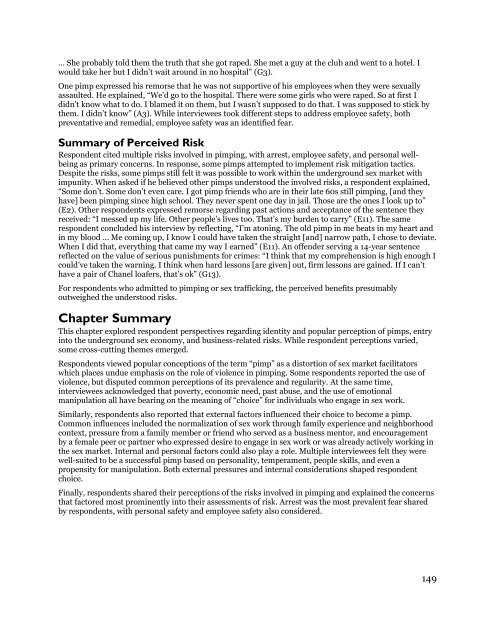413047-Underground-Commercial-Sex-Economy
413047-Underground-Commercial-Sex-Economy
413047-Underground-Commercial-Sex-Economy
Create successful ePaper yourself
Turn your PDF publications into a flip-book with our unique Google optimized e-Paper software.
… She probably told them the truth that she got raped. She met a guy at the club and went to a hotel. I<br />
would take her but I didn’t wait around in no hospital” (G3).<br />
One pimp expressed his remorse that he was not supportive of his employees when they were sexually<br />
assaulted. He explained, “We’d go to the hospital. There were some girls who were raped. So at first I<br />
didn’t know what to do. I blamed it on them, but I wasn’t supposed to do that. I was supposed to stick by<br />
them. I didn’t know” (A3). While interviewees took different steps to address employee safety, both<br />
preventative and remedial, employee safety was an identified fear.<br />
Summary of Perceived Risk<br />
Respondent cited multiple risks involved in pimping, with arrest, employee safety, and personal wellbeing<br />
as primary concerns. In response, some pimps attempted to implement risk mitigation tactics.<br />
Despite the risks, some pimps still felt it was possible to work within the underground sex market with<br />
impunity. When asked if he believed other pimps understood the involved risks, a respondent explained,<br />
“Some don’t. Some don’t even care. I got pimp friends who are in their late 60s still pimping, [and they<br />
have] been pimping since high school. They never spent one day in jail. Those are the ones I look up to”<br />
(E2). Other respondents expressed remorse regarding past actions and acceptance of the sentence they<br />
received: “I messed up my life. Other people’s lives too. That’s my burden to carry” (E11). The same<br />
respondent concluded his interview by reflecting, “I’m atoning. The old pimp in me beats in my heart and<br />
in my blood … Me coming up, I know I could have taken the straight [and] narrow path, I chose to deviate.<br />
When I did that, everything that came my way I earned” (E11). An offender serving a 14-year sentence<br />
reflected on the value of serious punishments for crimes: “I think that my comprehension is high enough I<br />
could’ve taken the warning. I think when hard lessons [are given] out, firm lessons are gained. If I can’t<br />
have a pair of Chanel loafers, that’s ok” (G13).<br />
For respondents who admitted to pimping or sex trafficking, the perceived benefits presumably<br />
outweighed the understood risks.<br />
Chapter Summary<br />
This chapter explored respondent perspectives regarding identity and popular perception of pimps, entry<br />
into the underground sex economy, and business-related risks. While respondent perceptions varied,<br />
some cross-cutting themes emerged.<br />
Respondents viewed popular conceptions of the term “pimp” as a distortion of sex market facilitators<br />
which places undue emphasis on the role of violence in pimping. Some respondents reported the use of<br />
violence, but disputed common perceptions of its prevalence and regularity. At the same time,<br />
interviewees acknowledged that poverty, economic need, past abuse, and the use of emotional<br />
manipulation all have bearing on the meaning of “choice” for individuals who engage in sex work.<br />
Similarly, respondents also reported that external factors influenced their choice to become a pimp.<br />
Common influences included the normalization of sex work through family experience and neighborhood<br />
context, pressure from a family member or friend who served as a business mentor, and encouragement<br />
by a female peer or partner who expressed desire to engage in sex work or was already actively working in<br />
the sex market. Internal and personal factors could also play a role. Multiple interviewees felt they were<br />
well-suited to be a successful pimp based on personality, temperament, people skills, and even a<br />
propensity for manipulation. Both external pressures and internal considerations shaped respondent<br />
choice.<br />
Finally, respondents shared their perceptions of the risks involved in pimping and explained the concerns<br />
that factored most prominently into their assessments of risk. Arrest was the most prevalent fear shared<br />
by respondents, with personal safety and employee safety also considered.<br />
149


